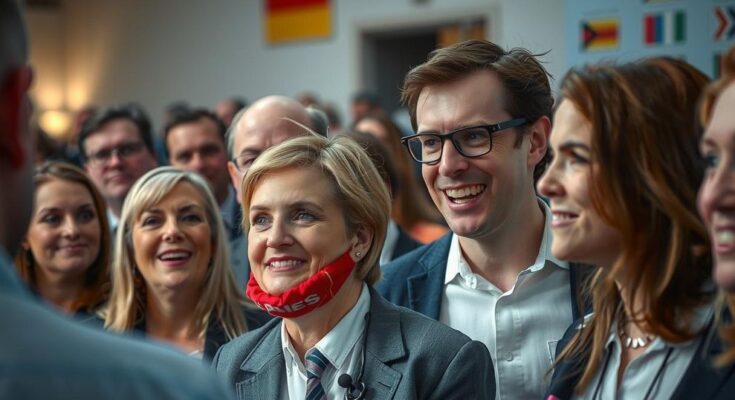Chancellor Olaf Scholz of the SPD has been officially endorsed as the party’s leading candidate for Germany’s parliamentary elections amid significant public dissatisfaction with his leadership. The SPD is preparing to combat the challenges posed by the CDU and CSU in the upcoming February elections. Scholz’s address at the party conference emphasized the importance of a strong democratic identity and the need for substantial social reforms for German citizens, amid the backdrop of increasing international tensions with the new U.S. administration and ongoing conflicts abroad.
Chancellor Olaf Scholz has received official backing as the leading candidate for Germany’s upcoming parliamentary election from the Social Democratic Party (SPD) during a recent conference in Berlin. Scholz’s administration, which includes the Greens and Free Democrats, faced significant challenges, leading to a no-confidence vote that precipitated the election scheduled for February 23. A recent ARD poll indicates a considerable 77% of Germans are dissatisfied with Scholz’s leadership, heightening the pressure as the SPD deliberated over campaign leadership amidst internal discord.
Chancellor Scholz maintains a resolute demeanor, seemingly unaffected by the prevailing discontent. At the party conference, he exhibited a fighting spirit, aware that failure in the forthcoming elections would result in one of the briefest tenures in German history. Currently, the SPD trails significantly behind the conservative Christian Democrats (CDU) and their Bavarian counterparts, the Christian Social Union (CSU). Nonetheless, party members remain optimistic, asserting that the political landscape could shift dramatically prior to election day.
In a broader international context, potential diplomatic tensions ensuing from the inauguration of Donald Trump as U.S. President are evident. Trump’s provocative territorial claims and demands regarding NATO funding have raised concerns within the German political landscape. Scholz firmly countered Trump’s assertions, bolstering his message with a reinforcement of Western values. He emphasized that every nation’s borders must remain inviolable, a stance reminiscent of the SPD’s successful opposition to the U.S. invasion of Iraq in 2003 under former Chancellor Gerhard Schröder.
Recognizing the implications of foreign relations, particularly with the United States amid increasing global turbulence and Russia’s ongoing war in Ukraine, Scholz reasserted the SPD’s commitment to supporting Ukraine while ensuring Germany does not become embroiled in the conflict. His address underlined a commitment to maintaining democratic institutions amid uncertainty, emphasizing the responsibility to safeguard national interests.
The SPD outlined an ambitious campaign program entitled “More for you. Better for Germany,” advocating for increased state investment and social equity, which would be financed through higher taxes on the wealthy. Central to their agenda is the preserved welfare state, with proposed measures aimed at improving the living conditions of ordinary Germans, including job stability, affordable housing, and robust social services.
Furthermore, the SPD seeks to establish a “Germany Fund” for infrastructure development and hints at a wealth tax for the affluent. In stark contrast to CDU/CSU proposals, the SPD contends that sustainable immigration policies must be maintained as part of its commitment to a diverse society. Scholz cautioned that the upcoming election represents a critical juncture that could dramatically alter the nation’s trajectory.
The forthcoming parliamentary election in Germany is pivotal, particularly considering the SPD’s recent political struggles. The party’s performance in government under Chancellor Scholz has faced substantial criticism leading to a no-confidence vote and subsequent election call. The critical polls reflect widespread discontent among the electorate, posing significant challenges for the SPD as it seeks to regain public trust and support. International geopolitical tensions, particularly with changes in U.S. leadership and the ongoing war in Ukraine, add layers of complexity to the election landscape, influencing both domestic and foreign policy discussions. As a result, the SPD aims to leverage these issues in their campaign strategy, presenting a vision that resonates with the electorate’s needs and concerns.
In conclusion, Chancellor Olaf Scholz faces a formidable challenge as he leads the SPD into an election fraught with uncertainty. With the support of the party behind him, he is determined to combat public dissatisfaction and calls for a stronger social state amidst rising global tensions. The outcome of the February elections will not only determine his political future but also shape the direction of Germany in addressing pressing domestic and international issues. The SPD’s campaign promises a commitment to equity, investment, and a steadfast approach to governance, vying to resonate with voters dissatisfied with the current landscape.
Original Source: www.dw.com




